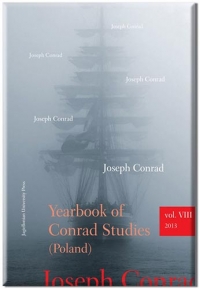Detecting Kunstlerroman in Conrad’s The Secret Agent: A Self-reflexive Type
Detecting Kunstlerroman in Conrad’s The Secret Agent: A Self-reflexive Type
Author(s): Maggie HollandSubject(s): Studies of Literature
Published by: Wydawnictwo Uniwersytetu Jagiellońskiego
Keywords: double agents; collaboration; dichotomy; genres transgression; narcissism
Summary/Abstract: “Detecting Kunstlerroman in Conrad’s The Secret Agent: A Self-reflexive Type” argues that Joseph Conrad’s The Secret Agent: A Simple Tale (1907) is a double-voiced, double-genred, co-dependent text. The novel’s detective story voice both supports, and is dependent on, the Kunstlerroman voice. The novel’s voice supports the mise-en-abyme Kunstlerroman genre in that it, as a detective story, alerts the reader to the literary clues and hints to authorial self-reflexivity that are not overtly apparent in the text and hardly at all apparent in the story. The paper goes to some length to show that in its compliance with detective story conventions, with foregrounding its own method of detection, Conrad’s novel belongs to a self-reflexive genre. Nonetheless, the detective story dependents on the Kunstlerroman to show both genres in its two facing mirrors. The Kunstlerroman―through the self-assertive interpolation of a first-person narrator in a third-person narrative―highlights the self-reflexive nature of the detective story. In so doing the paper claims that, though reciprocal, the Kunstlerroman declares its own authority. The two voices are, paradoxically, mutually dependent and independent. The paper substantiates this rather obscure reciprocity claim by citing what it considers to be the analogous “Prefaces” to the Conrad / Ford Madox Ford 1924 epistolary novella collaboration, The Nature of a Crime (1909). While these prefaces contribute a plausible analogy between the novel and the novella, the paper also relies on Edward Said’s remarks on Conrad’s letters to add credence to the claim that The Secret Agent belongs to the Kunstlerroman- as well as to the detective story genre. Narratologists Linda Hutcheon as well as Susana Onega and Jose A.G. Landa provide scholarship on both genres, and Eric Meyer’s essay on The Nature of a Crime proves invaluable.
Journal: Yearbook of Conrad Studies (Poland)
- Issue Year: 2016
- Issue No: XI
- Page Range: 93-108
- Page Count: 16
- Language: English

